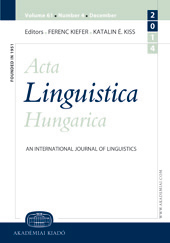The Hungarian imperative particle hadd.
A contrastive look at the development of analogous markers of sentence mood in some European languages
The Hungarian imperative particle hadd.
A contrastive look at the development of analogous markers of sentence mood in some European languages
Author(s): Attila PéteriSubject(s): Syntax, Pragmatics
Published by: Akadémiai Kiadó
Keywords: particles; sentence mood; syntax; pragmatics; directive speech acts; contrastive linguistics;
Summary/Abstract: This study is devoted to the Hungarian sentence mood particle hadd, which developed into a particle from the imperatival form of the verb hagy ‘let’. It primarily functions in non-addressee-oriented directives, i.e., it marks speech acts meant by the speaker to instigate actions of the speaker him- or herself or of third parties rather than actions of the interlocutor. The interlocutor is meant to play a—mediating, supporting, or tolerating—“secondary” role in this. Based on corpus research, the syntax and pragmatics of the particle hadd will be illustrated. The syntactic position of hadd differs from that of modal particles in being considerably more fixed. Concerning its pragmatic function, uses leading away from the function of a particle indicating sentence mood can be discerned. Similar developments can be illustrated for other European languages. In some languages (e.g., the Slavic languages), the word meaning ‘let’ develops into a particle, in other languages it turns into an auxiliary verb.
Journal: Acta Linguistica Hungarica (Since 2017 Acta Linguistica Academica)
- Issue Year: 59/2012
- Issue No: 4
- Page Range: 439-463
- Page Count: 25
- Language: English

